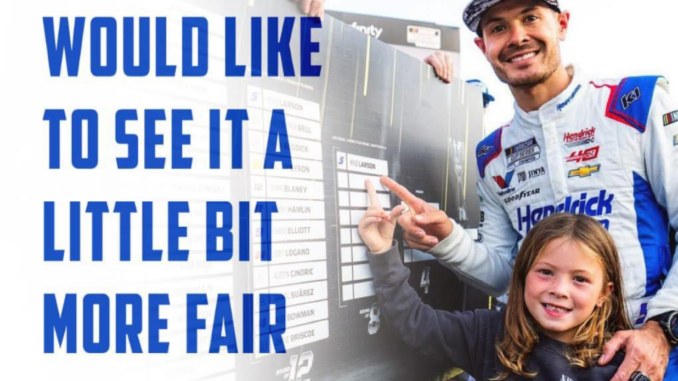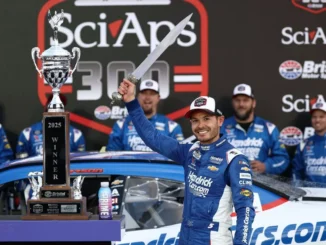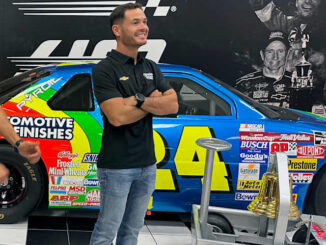
**Kyle Larson Challenges NASCAR Playoff System: Is the Sport’s Crown Jewel Format Broken?**
Kyle Larson, one of NASCAR’s most talented and outspoken drivers, has ignited a firestorm of controversy by calling for changes to the sport’s playoff system. His recent remarks about wanting the format to be “a little bit more fair” have reverberated through the NASCAR community, sparking debate among fans, analysts, and fellow drivers. Larson’s comments have raised an important question: Is the playoff format, designed to create edge-of-your-seat drama, fundamentally flawed?
This isn’t the first time the playoff format has been scrutinized, but Larson’s voice adds new weight to the conversation. As a seasoned competitor and a former Cup Series champion, his insights carry a level of credibility that fans and officials alike cannot ignore. But what exactly is wrong with the current system, and could his comments be the catalyst for meaningful reform?
—
### **The Current NASCAR Playoff Format: Exciting or Problematic?**
NASCAR’s playoff system, introduced in 2014, was meant to inject excitement into the championship race. By dividing the season’s final ten races into elimination-style rounds, the format creates a “win-and-advance” scenario that guarantees high-stakes drama. However, critics argue that the structure rewards short-term performance over season-long consistency, making it possible for a dominant driver to miss out on the championship due to a single poor race.
Kyle Larson, known for his strategic racing and ability to adapt to different tracks, has consistently been a top contender. Yet even he admits that the current system feels unbalanced. His statement—“I would like to see it a little bit more fair”—has left fans wondering what an ideal playoff structure might look like. Should NASCAR return to its traditional points-based system, or can the existing format be adjusted to address its shortcomings?
The controversy isn’t hypothetical. This season alone, top drivers with dominant performances, like Martin Truex Jr. and Denny Hamlin, found themselves on the losing end of the playoff system. While their regular-season success was undeniable, one bad race in a crucial elimination round sealed their fate. Larson’s comments seem to echo the frustrations of these drivers and their fans, who believe the current system devalues the consistency required to excel across a grueling 36-race season.
—
### **Fan Reactions: A Community Divided**
Larson’s remarks have divided NASCAR’s passionate fan base. Supporters of the current playoff system argue that it creates the kind of dramatic moments that draw casual viewers to the sport. They point to thrilling elimination races and the unpredictability of a championship-deciding finale as evidence of its success.
“*The playoffs are what make NASCAR exciting. It’s unique compared to other motorsports,*” one fan wrote on social media. “*If we go back to the old points system, the championship will be decided weeks before the season ends. Where’s the fun in that?*”
On the other hand, many fans agree with Larson’s critique, arguing that the playoffs feel more like a gimmick than a true test of a driver’s skill and consistency. “*The best driver of the year should win the championship. End of story,*” a fan tweeted in response to Larson’s statement. “*One bad race shouldn’t erase 25 good ones.*”
The division extends to the drivers themselves. Some, like Denny Hamlin, have openly criticized the format in the past, calling it unfair to those who perform well all season. Others, like Joey Logano, have embraced the playoff system, crediting it with elevating the sport’s entertainment value and intensity.
—
### **A Historical Perspective: How Did We Get Here?**
Before the playoff era, NASCAR used a straightforward points system to determine its champion. This method rewarded consistency over the course of an entire season, but it often led to anticlimactic finales. In 2003, Matt Kenseth won the championship despite only winning one race all season, prompting NASCAR to rethink its approach.
The Chase for the Cup was introduced in 2004, eventually evolving into today’s elimination-style playoffs. While the format has undeniably created memorable moments, it has also faced consistent backlash from purists who feel it compromises the integrity of the sport.
Kyle Larson’s criticism taps into this ongoing tension between tradition and innovation. His statement isn’t just a critique of the current format; it’s a plea for NASCAR to find a balance that rewards both drama and merit.
—
### **What Would a “Fairer” System Look Like?**
If NASCAR were to heed Larson’s call for fairness, what changes might we see? One possibility is a hybrid system that combines the drama of playoffs with the consistency of a points-based structure. For example, NASCAR could introduce bonus points for regular-season performance that carry more weight in the playoffs, giving top drivers a cushion against bad luck.
Another option is to rethink the winner-take-all nature of the championship race. Critics argue that deciding the championship in a single event diminishes the importance of the previous 35 races. A multi-race championship round, similar to Formula 1’s season-long battle for points, could strike a better balance between excitement and equity.
However, any change to the format is likely to face resistance. NASCAR’s leadership has invested heavily in the current system, promoting it as a key driver of the sport’s appeal to younger audiences and casual fans. The question is whether they’re willing to risk alienating a portion of the fanbase to address the concerns raised by Larson and others.
—
### **What’s Next for NASCAR?**
Kyle Larson’s comments come at a pivotal moment for NASCAR. With the offseason fast approaching, the sport’s decision-makers have an opportunity to reflect on the effectiveness of the playoff format and consider whether changes are needed. Larson’s voice, amplified by his status as one of the sport’s premier drivers, could serve as a catalyst for meaningful discussions.
But will NASCAR listen? The organization has a history of standing by its decisions, even in the face of widespread criticism. For now, fans are left to speculate about what the future holds.
One thing is certain: Larson’s statement has reignited a debate that isn’t going away anytime soon. As NASCAR grapples with the challenge of balancing tradition and innovation, its response—or lack thereof—will shape the sport’s trajectory for years to come.
—
Kyle Larson has thrown down the gauntlet, challenging NASCAR to reevaluate a system that he and many others view as flawed. Whether you’re a diehard supporter of the playoffs or a critic who longs for the days of points-based championships, one question looms large: Can NASCAR afford to ignore the growing calls for change?
Let the debate begin. What do you think? Should NASCAR tweak its playoff format, or is it perfect as is? Share your thoughts and join the conversation as this story continues to unfold.



Be the first to comment